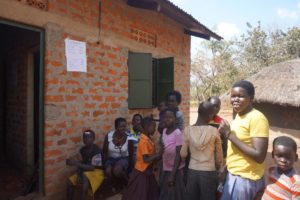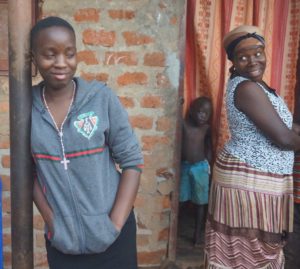“We are hard pressed on every side, but not crushed; perplexed, but not in despair; persecuted, but not abandoned; struck down, but not destroyed. We always carry around in our body the death of Jesus, so that the life of Jesus may also be revealed in our body.”
My work partner Emma shared this on Facebook yesterday. You’ll soon see why.
On the surface, lockdown here in Northern Uganda seems relaxed compared with New Zealand. We can move around, buy food and bike where we want. Yes, shops are closed and we can’t catch public transport but Tessa and I live comfortably. If you are poor, however, the story is radically different. Fragile situations fall apart.
Our neighbor Florence used to raise a couple of dollars a day by ferrying water for people. Now the borehole keeper won’t let her continue, as Florence may ferry the virus. Our good friend Opiyo worked as a laborer on a building site, but with hardware shops shut he can’t continue. Forget about recovery packages and wage subsidies. There is zero help from the government here – you’re on your own. Opiyo’s wife Paska is about to give birth she’s not sure how she will reach the hospital.
Before lockdown, motorbikes acted as ambulances for over 90% of hospital transfers. Under lockdown motorbikes aren’t allowed to carry people. Reaching hospital is now treacherous, and difficult situations are now deadly.
Tessa and I live near Florence, Opiyo and Paska in Lacor center, a hospital village. When Paska’s labour starts, even if she can’t catch a motorbike she’ll walk down the road to the best hospital in the region. She’ll be fine. Deep in the village the scenario is far worse.
Yesterday I got a call from Nurse Innocent, who manages a remote OneDay Health center (www.onedayhealth.org), operated under the Anglican Diocese of Northern Uganda. A 10-year-old boy was almost unconscious with severe anemia from malaria.
| Innocent gave intravenous anti-malarial drugs and fluids, but the boy needed blood and fast. Unfortunately the motorcycle taxis refused to carry the boy to hospital, fearing police brutality under lockdown. The ambulance arrived 6 hours later. Too late. A $3 motorcycle ride probably would have saved him. Nurse Innocent prayed with the distraught father today when he returned to pay his dead son’s medical bill. Obviously we forgave it.
Today I feared a similar tragedy. Just a few hours ago nurse Simon was treating a pregnant woman with severe malaria in remote Ocim OneDay Health Center. Fortunately a motorcycle taxi was willing to brave the brutal police roadblocks, and she arrived safely to hospital. |
 |
Image: Ocim Rural Health Centre on opening day C/o Anglican Missions
As coronavirus approaches, our limited resources will be stretched past their limit. Our staff use one facemask per day while health workers in NZ use one per patient. By the end of tomorrow our masks will run out in St Philips, our busiest health center. Today I biked around five pharmacies in town, only to find that all facemasks were sold out. The NZ health system may be put to the test, but Uganda’s failed before COVID-19 moved from a pangolin to a primate. John the Baptist said “Anyone who has two shirts should share with the one who has none, and anyone who has food should do the same.” Perhaps this applies to facemasks as well.
| Update:
I wrote this article last week, and since then there has been an incredible response both through NZCMS supporters and through the targeted Give-a-Little page. We’ve raised enough money not only to buy enough supplies for our 19 Anglican health centers but also to contribute to critical shortages at our local Catholic hospital and pay for transport to larger hospitals if our patients need it. Even in these times which are so disquieting for NZ it is inspiring to see so many people think of the least of these on the other side of the world. “We are hard pressed on every side, but not crushed” |
 |
Image: Florence and her daughter C/o Anglican Missions
